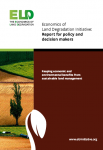The Economics of Land Degradation (ELD) Initiative launched the synthesis report, ‘Value for Land: Prosperous lands and positive rewards through sustainable land management,' as well as an accompanying summary for policy and decision makers at a special event in Brussels, Belgium on 15 September 2015.
 15 September 2015: The Economics of Land Degradation (ELD) Initiative launched a synthesis report, titled ‘Value for Land: Prosperous lands and positive rewards through sustainable land management,’ as well as an accompanying summary for policy and decision makers at a special event in Brussels, Belgium, on 15 September 2015. The reports draw on ELD case studies carried out in five African and Middle Eastern countries, as well as regional and global analyses.
15 September 2015: The Economics of Land Degradation (ELD) Initiative launched a synthesis report, titled ‘Value for Land: Prosperous lands and positive rewards through sustainable land management,’ as well as an accompanying summary for policy and decision makers at a special event in Brussels, Belgium, on 15 September 2015. The reports draw on ELD case studies carried out in five African and Middle Eastern countries, as well as regional and global analyses.
The reports mark the conclusion of the first phase of ELD Initiative research, which aimed to develop a global approach for capturing the direct and indirect values of land and land-based ecosystems with a view to providing a “comprehensive compendium of knowledge on the topic” that can contribute to increased investments in sustainable land management (SLM) and land degradation neutrality (LDN).
The main report opens with a description of the ELD Initiative and its overall goal of contributing to increased global understanding of the value of land and making an economic case for SLM in preventing the loss of natural capital, preserving ecosystem services, combating climate change, and addressing food, energy and water security. Subsequent chapters focus on, among other topics: ELD economic tools, approaches and methodologies, including the “6+1 approach to the economic valuation of ecosystem services;” the economic benefits of SLM; global, regional and national scenario analyses demonstrating the value of land and land-based ecosystems; needs and priorities identified during ELD Initiative stakeholder consultations held in different countries across the world; enabling conditions for successful SLM processes; and final recommendations and steps forward to a LDN world.
The report concludes with an overview of the next phase of the ELD Initiative, starting in 2016, which will focus on “fostering and reaping of further benefits from the network of experts, practitioners and decision-makers that has been established.”
The accompanying summary for policy makers and decision makers, titled ‘Reaping economic and environmental benefits from sustainable land management,’ highlights a range of environmental economic instruments to enable adoption and effective implementation of SLM measures by all stakeholders. The report begins with a brief overview of why it is important to value land, and key facts and figures about the interlinkages among land degradation, ecosystem services losses, poverty and food insecurity, climate change and urbanization and the benefits of SLM. It then discusses a range of practical policy options and instruments to incentivize SLM. These are followed by recommendations on how to introduce total economic valuation in decision making and overcome barriers to action.
During the launch event, held under the theme ‘Land Solutions,’ high-level representatives from the European Commission, Ethiopia’s Ministry of Environment and Forestry, the UN Convention to Combat Desertification (UNCCD) and the German Federal Ministry for Economic Cooperation and Development discussed the relevance of the ELD study findings to national and global policies, including on food security, climate change and migration. A follow up launch event will take place on 24 September 2015 during the UN General Assembly (UNGA) to be held at UN Headquarters in New York, US. [ELD Announcement] [Programme of Launch Event] [The Value of Land – ELD Main Report] [ELD Report for policy and decision makers] [Natural Resources Policy & Practice Story on ELD Users Guide for Assessing the Economics of Land Management] [Natural Resources Policy & Practice Story on ELD Botswana Case Study] [Natural Resources Policy & Practice Story on ELD Ethiopia Case Study] [Natural Resources Policy & Practice Story on ELD Economic Assessments of SLM in Jordan, Mali and Sudan]